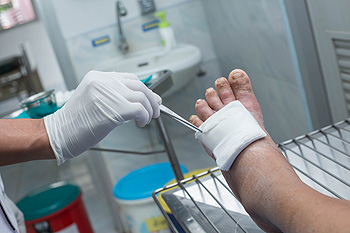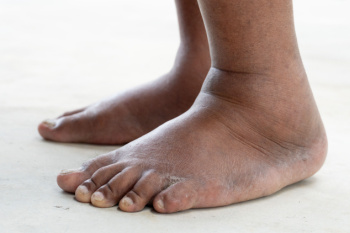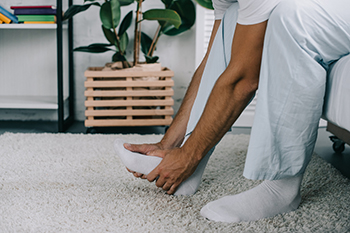Items filtered by date: June 2024
Do You Suffer From Painful Feet?
How Being Overweight Affects the Feet

Excess weight does not just affect your waistline, it also can have a significant impact on the health of your feet. Studies have consistently shown a strong correlation between being overweight and various foot problems. Carrying extra pounds puts undue stress on the feet and can lead to plantar fasciitis, osteoarthritis, and even stress fractures. Research indicates that people with a higher body mass index, or BMI, are more likely to endure foot pain and disability that affects their ability to exercise and perform daily activities. Obesity alters the gait and increases the risk of joint injuries in the ankles, knees, and hips. Research reveals a stark increase in the likelihood of needing a knee replacement as the BMI rises. Managing weight through healthy diet choices and regular physical activity reduces the strain on your feet, thereby reducing the risk of developing debilitating foot conditions. Practicing good foot hygiene, wearing proper footwear, and seeking professional foot care from a podiatrist are methods to prevent and alleviate foot pain from obesity. If you are overweight and experiencing foot problems, it is suggested that you schedule an appointment with a podiatrist for treatment options.
Obesity has become very problematic at this point in time and can have extremely negative effects on the feet. If you’re an obese individual and are concerned about your feet, contact Mark Poplawski, DPM from Jersey Shore Podiatry, LLC. Our doctor can provide the care you need to keep you pain-free and on your feet.
Obesity and Your Feet
Since your feet are what support your entire weight when standing, any additional weight can result in pain and swelling. Being overweight is one of the main contributors to foot complications.
Problems & Complications
Extra Weight – Even putting on just a few extra pounds could create serious complications for your feet. As your weight increases, your balance and body will shift, creating new stresses on your feet. This uneven weight distribution can cause pain, even while doing the simplest tasks, such as walking.
Diabetes – People who are overweight are at serious risk of developing type-2 diabetes, which has a drastic impact on the health of your feet. As you get older, your diabetes might worsen, which could lead to loss of feeling in your feet, sores, and bruises. You could also become more prone to various infections.
Plantar fasciitis – Pressure and stress that is placed on muscles, joints, and tendons can trigger plantar fasciitis, which is an inflammation of tissue that forms along the bottom of the foot.
If you have any questions please feel free to contact our office located in Toms River, NJ . We offer the newest diagnostic and treatment technologies for all your foot and ankle needs.
Dealing With Diabetic Foot Ulcers

Diabetic foot ulcers pose a significant risk to individuals with diabetes, often occurring on the ball of the foot or the bottom of the big toe. While some foot ulcers may not cause pain, it's important to seek immediate medical attention, as neglecting them can lead to infections and potential limb loss. Treatment approaches vary depending on the severity of the diabetic foot ulcer. Among them are X-rays to assess bone health and debridement, or cleaning out dead tissue, which may require hospitalization. Special footwear or braces may be recommended to protect the foot and aid healing. In cases of poor circulation, consultation with a vascular surgeon may be necessary. Even after an ulcer heals, ongoing care is vital to prevent recurrence, including the use of specialized footwear and daily foot monitoring for any sores or trouble spots. Individuals with diabetes face a higher risk of amputation, due to complications like peripheral artery disease and neuropathy, but limb loss can be prevented with regular foot care, proper medical supervision, and suitable footwear. Dealing with diabetic foot ulcers includes having a podiatrist as a member of your healthcare team. For help with foot ulcers, it is suggested that you make an immediate appointment with a podiatrist for care.
Diabetic foot care is important in preventing foot ailments such as ulcers. If you are suffering from diabetes or have any other concerns about your feet, contact Mark Poplawski, DPM from Jersey Shore Podiatry, LLC. Our doctor can provide the care you need to keep you pain-free and on your feet.
Diabetic Foot Care
Diabetes affects millions of people every year. The condition can damage blood vessels in many parts of the body, especially the feet. Because of this, taking care of your feet is essential if you have diabetes, and having a podiatrist help monitor your foot health is highly recommended.
The Importance of Caring for Your Feet
- Routinely inspect your feet for bruises or sores.
- Wear socks that fit your feet comfortably.
- Wear comfortable shoes that provide adequate support.
Patients with diabetes should have their doctor monitor their blood levels, as blood sugar levels play such a huge role in diabetic care. Monitoring these levels on a regular basis is highly advised.
It is always best to inform your healthcare professional of any concerns you may have regarding your feet, especially for diabetic patients. Early treatment and routine foot examinations are keys to maintaining proper health, especially because severe complications can arise if proper treatment is not applied.
If you have any questions please feel free to contact our office located in Toms River, NJ . We offer the newest diagnostic and treatment technologies for all your foot and ankle needs.
Foot Swelling Caused by Psoriatic Arthritis
 Psoriatic arthritis can cause swelling in the feet, making daily activities such as walking and wearing shoes very uncomfortable. This condition is a type of inflammatory arthritis that can cause inflammation in the joints and tissues of the feet that results in swelling and stiffness. The swelling may also be accompanied by pain, tenderness, and redness further impacting mobility and quality of life. When individuals with psoriatic arthritis experience flare-ups of symptoms, the swelling and discomfort in the feet can become worse. Managing psoriatic arthritis involves a thorough approach that can include medication, physical therapy, and lifestyle adjustments. Podiatrists, or foot doctors, can offer specialized care for foot-related symptoms of psoriatic arthritis. Some recommendations are supportive footwear, orthotic inserts, and exercises to improve mobility and reduce discomfort. If you have psoriatic arthritis and are experiencing swelling in your feet, it is suggested that you schedule an appointment with a podiatrist for treatment.
Psoriatic arthritis can cause swelling in the feet, making daily activities such as walking and wearing shoes very uncomfortable. This condition is a type of inflammatory arthritis that can cause inflammation in the joints and tissues of the feet that results in swelling and stiffness. The swelling may also be accompanied by pain, tenderness, and redness further impacting mobility and quality of life. When individuals with psoriatic arthritis experience flare-ups of symptoms, the swelling and discomfort in the feet can become worse. Managing psoriatic arthritis involves a thorough approach that can include medication, physical therapy, and lifestyle adjustments. Podiatrists, or foot doctors, can offer specialized care for foot-related symptoms of psoriatic arthritis. Some recommendations are supportive footwear, orthotic inserts, and exercises to improve mobility and reduce discomfort. If you have psoriatic arthritis and are experiencing swelling in your feet, it is suggested that you schedule an appointment with a podiatrist for treatment.
Swollen feet can be a sign of an underlying condition. If you have any concerns, contact Mark Poplawski, DPM of Jersey Shore Podiatry, LLC. Our doctor can provide the care you need to keep you pain-free and on your feet.
Swollen feet are a common ailment among pregnant women and people who stand or sit for extended periods. Aging may increase the possibility of swollen feet and patients who are obese often notice when their feet are swelling too. There may be medical reasons why swollen feet occur:
- Phlebitis - A condition that causes the veins to become inflamed and can also cause leg pain.
- Liver disease - This may lead to low blood levels of albumin which is a protein. This can cause fluid in the blood to pass into the tissues and several areas of the body can become swollen.
- Heart failure - When the heart doesn’t pump properly the blood that is normally pumped back to the heart can pool in the veins of the legs causing swollen feet.
- Kidney disease - One of the main functions of the kidneys is releasing excess fluid in the body. This type of condition can make it difficult for the kidneys to function properly, and as a result the feet may become swollen.
- Deep-vein thrombosis (DVT)- This is a serious condition where blood clots form in the veins of the legs. They can block the return of blood from the legs to the heart which may cause the feet to swell. It is important to be treated by a podiatrist if this condition is present.
Swollen feet can also be caused by bone and tendon conditions, including fractures, arthritis, and tendinitis. Additionally, there may be skin and toenail conditions and an infection may cause the feet to swell. Patients who take medicine to treat high blood pressure may be prone to getting swollen feet.
Many patients elevate their feet to help relieve the swelling and this is generally a temporary remedy. When a podiatrist is consulted the reason behind the swelling can be uncovered and subsequently treated.
If you have any questions please feel free to contact our office located in Toms River, NJ . We offer the newest diagnostic tools and technology to treat your foot and ankle needs.
Foot Health Can Be a Reflection of Overall Wellness

Foot health serves as a silent communicator, often revealing underlying issues within the body. Foot cramps, seemingly innocuous, can indicate dehydration or nutrient deficiencies, while swollen feet may signify heart, kidney, or circulatory problems. Cold feet could be a sign of poor circulation or thyroid dysfunction, requiring attention to prevent further complications. Similarly, tingling sensations in the feet may point to a pinched nerve elsewhere in the body. Ignoring these signals can lead to developing health issues over time. Paying attention to foot health is thus imperative, not just for comfort but for overall well-being. Regular foot care, including proper footwear, moisturizing, and gentle exercises, can promote circulation and alleviate discomfort. However, if symptoms persist, it is suggested that you consult a podiatrist for an accurate diagnosis and appropriate treatment.
When dealing with systemic disease of the feet, it is extremely important to check the affected areas routinely so that any additional problems are caught quickly. If you have any concerns about your feet and ankles contact Mark Poplawski, DPM from Jersey Shore Podiatry, LLC. Our doctor will assist you with all of your podiatric needs.
Systemic Diseases of the Feet
Systemic diseases affect the whole body, and symptoms usually are displayed in the feet. This condition can make a patient’s ability to walk unbearable. Systemic diseases include gout, diabetes mellitus, neurological disorders, and arthritis.
Gout – is caused by an excess of uric acid in the body. Common symptoms include pain, inflammation, and redness at the metatarsal/phalangeal joint of the base big toe. Gout can be treated by NSAIDs to relieve pain and inflammation, and other drugs that lower the acid levels in the body.
Diabetes mellitus – is an increase in the level of blood sugar that the body cannot counteract with its own insulin. Failure to produce enough insulin is a factor in Diabetes.
Diabetes of the Feet
Diabetic Neuropathy – may lead to damaged nerves and affect the feet through numbness and loss of sensation.
Peripheral Vascular Disease – can restrict the blood flow to the feet, and often times lead to amputation of the feet.
If you have any questions please feel free to contact our office located in Toms River, NJ . We offer the newest diagnostic and treatment technologies for all your foot and ankle needs.





